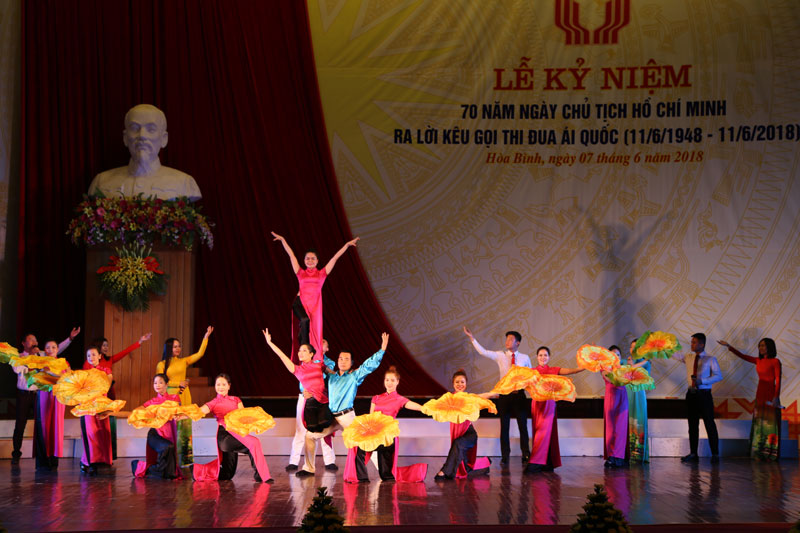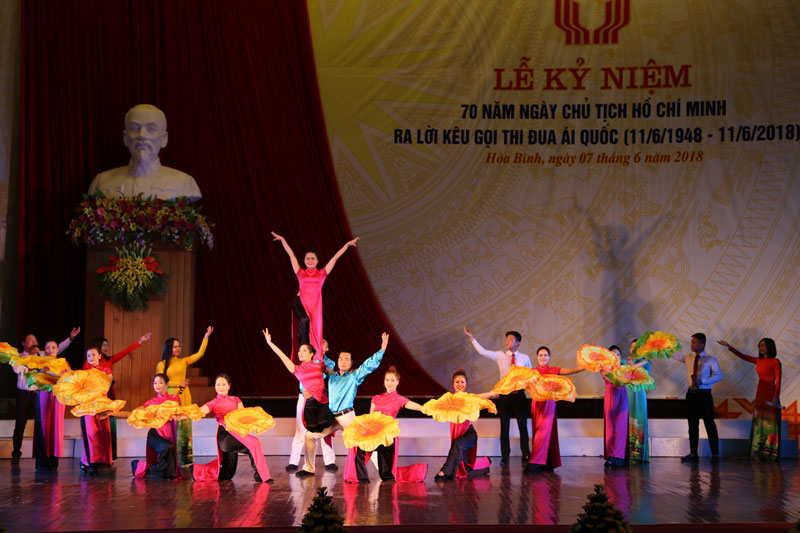
(HBO) – Being located at the Northwest gateway of the country, Hoa Binh province is known for its famous "Hoa Binh Culture" - the cultural center of the ancient Vietnamese people, and the legendary epic of "De Dat, De Nuoc”. Moreover, this is the land of festivals and the treasure of folk music of ethnic groups of Muong, Dao Thai, Tay, Mong, etc., where is full of folk songs "sweet like honey bees, fresh like streams". Therefore, despite the ancient or the reality, Hoa Binh is still the promised land for great literature and art performances.

The art performance team of the provincial
ethnic minority organizes many performances for serving the political and
cultural events of the province and the local people.
To be encouraged and set up the background
for the past 10 years, the literature writers and artists of the province have
composed and advertised over 800 works, including 48 poems, 15 novels, 35 short
stories, 30 episodes being studied and collected; staging over 50 plays; composing
130 songs; over 100 concerts; over 450 photography works; over 100 works of
art. When being promoted to the public, art councils, hundreds of works have
been awarded prizes of literature and arts from the State to the locality. The
most outstanding works are collections, researches on culture, customs and
traditions of the Muong ethnic group of the artist Bui Huy Vong (whose works
have been awarded 11 awards of Vietnam Folk Arts Association). With his such
great contributions, in 2017, the talented artist Bui Huy Vong received the
National Prize for literature and art for his works of " ẩm thực dân gian Mường vùng huyện Lạc Sơn - Muong folk food in
Lac Son district” và "Tang lễ cổ truyền của
người Mường – the traditional Funeral of Muong ethnic
people”. The Poet Le Va, won the A prize at the poetry contest organized by the
Ministry of Culture, Sports and Tourism. The Painter Tran Thi Thu, whose works
won A prize in the contest held by the Vietnam Fine Arts Association. The
Photographer Nguyen Xuan Thanh, in turn, has won A and B prizes in photography
at the National level, etc.
To be dedicated fully to the arts, over the
years, our province has five artists being awarded the title of Elite Artist.
With an increasingly vibrant and widespread emulation movement aimed at building cultured residential areas and cultured families, Yen Thuy District has been making steady progress toward improving both the material and spiritual well-being of its people, while fostering a civilized, prosperous, beautiful, and progressive community.
Once lacking recreational spaces and community facilities, Residential Group 2 in Quynh Lam Ward (Hoa Binh City) has recently received attention for the construction of a new, spacious, and fully equipped cultural house. The project followed the model of state support combined with public contributions in both labor and funding.
The "All people unite to build cultural life" movement, which has been effectively integrated with Kim Boi district’s socio-economic development goals, is fostering a lively spirit of emulation across local residential areas, hamlets, villages, public agencies, and enterprises. In addition, through the initiative, traditional cultural values are being preserved and promoted, while community solidarity and mutual support in poverty reduction and economic development are being strengthened.
A working delegation of the Hoa Binh provincial People’s Committee led by its Permanent Vice Chairman Nguyen Van Toan on June 11 inspected the progress of a project to build the Mo Muong Cultural Heritage Conservation Space linked to tourism services in Hop Phong commune, Cao Phong district.
Born and growing in the heroic land of Muong Dong, Dinh Thi Kieu Dung, a resident in Bo town of Kim Boi district, in her childhood was nurtured by the sweet lullabies of her grandmother and mother. These melodies deeply imprinted on her soul, becoming an inseparable part of her love for her ethnic group's culture. For over 20 years, this love for her hometown has driven Dung to research, collect, and pass down the cultural values of the Muong people to future generations.
In the final days of May, the Ethnic Art Troupe of Hoa Binh Province organized performances to serve the people in remote, mountainous, and particularly disadvantaged areas within the province. These were not just ordinary artistic shows, but they were the meaningful journeys aimed at spreading cultural values, enhancing the spiritual life of the people and contributing to the preservation of ethnic minority cultural identities.



